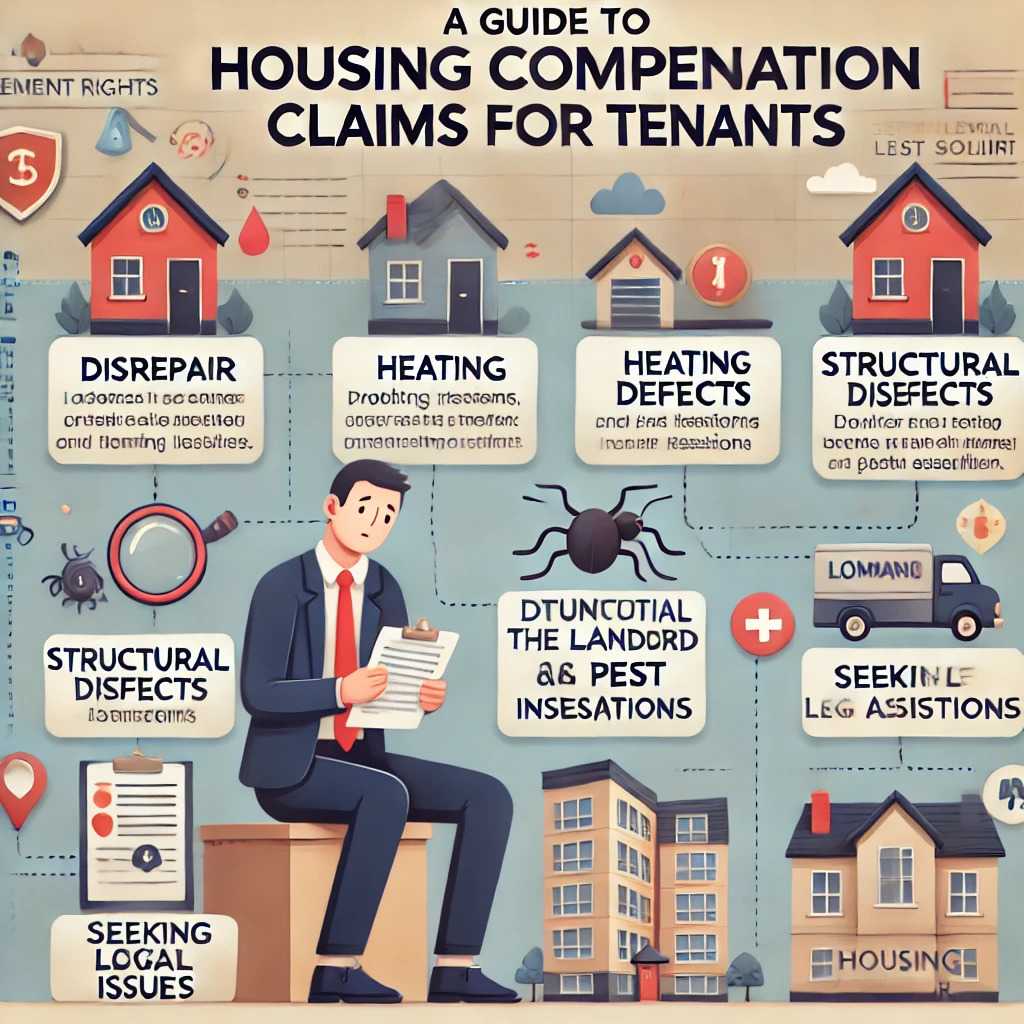If you’re living in substandard housing due to disrepair or neglect, you may be eligible for a housing compensation claim. Many tenants endure damp, mold, faulty heating, or other issues that make their homes uncomfortable or even unsafe. Housing compensation claims allow tenants to seek financial redress for the inconvenience, stress, or health impacts caused by these conditions. In this guide, we’ll explain the basics of housing compensation claims, the types of disrepair that may qualify, and how you can take steps to ensure your landlord fulfills their legal responsibilities to provide a safe, livable home.
Your Guide to Housing Compensation Claims: Know Your Rights
Living in a property that’s poorly maintained or in disrepair can be a challenging experience, impacting both physical health and mental well-being. Fortunately, tenants facing these issues may be entitled to housing compensation claims to recover costs and seek justice. This guide explains what housing compensation claims are, when they apply, and how you can pursue compensation to ensure your rights as a tenant are respected.
1. What Are Housing Compensation Claims?
Housing compensation claims are legal claims that tenants can make against landlords who fail to maintain their properties in a habitable condition. When landlords neglect essential repairs or allow issues such as dampness, mold, heating problems, or structural defects to persist, tenants have the right to seek compensation. These claims not only provide financial redress for distress and inconvenience but also hold landlords accountable for meeting their obligations.
2. Common Issues That May Qualify for a Claim
Many types of housing disrepair issues may justify a compensation claim. Here are some of the most common:
- Damp and Mold: Damp walls and mold growth can cause respiratory problems and allergies, especially in vulnerable groups like children or the elderly. When landlords fail to address these issues, tenants may have grounds for a compensation claim.
- Heating and Hot Water Problems: Functional heating and hot water systems are essential, especially in colder months. Persistent heating issues can make homes uninhabitable, and tenants may be entitled to compensation if these problems aren’t resolved promptly.
- Structural Defects: Structural problems, like cracks in walls, ceiling leaks, and broken windows, not only make a home unsafe but also risk further property damage. Tenants can claim compensation if landlords ignore these necessary repairs.
- Plumbing Issues and Leaks: Leaks, blocked drains, and defective plumbing can disrupt daily life and damage belongings. Compensation claims can cover the costs of repairs as well as compensation for inconvenience.
- Pest Infestations: Living with pests like rodents or insects can cause both physical and mental distress. Landlords have a responsibility to provide a pest-free environment, and if they fail to do so, tenants may be eligible to claim.
3. Eligibility for Housing Compensation Claims
To be eligible for a housing compensation claim, tenants need to demonstrate that the landlord was aware of the disrepair but failed to take appropriate action. This is often done by providing records of requests for repairs or proof of notifying the landlord about the issues. Tenants may also need to show that the disrepair affected their living conditions significantly, causing health issues, damage to personal belongings, or other forms of distress.
4. Steps to File a Housing Compensation Claim
Here’s a step-by-step outline for making a housing compensation claim:
- Document the Issues: Take photographs, keep records of any communication with the landlord, and log the dates of when issues were reported. Having a detailed record of the problems can strengthen your case.
- Notify the Landlord: Before filing a claim, notify your landlord of the issues in writing. Include details and any evidence you’ve collected to show the extent of the disrepair.
- Seek Legal Assistance: Working with a housing disrepair solicitor can simplify the claim process. These professionals specialize in tenant rights and can help you navigate the legal steps, prepare evidence, and negotiate with the landlord on your behalf.
- File the Claim: If the landlord still refuses to address the issues, your solicitor can assist in filing a formal compensation claim. Claims can include compensation for physical discomfort, property damage, and any related health issues.

5. Types of Compensation Tenants Can Receive
Compensation claims for housing disrepair generally cover the following:
- General Damages: Compensation for the physical discomfort, stress, and health impact caused by the disrepair.
- Special Damages: Reimbursement for expenses directly related to the disrepair, such as damaged belongings, medical costs, or extra heating bills.
- Rent Rebates: If the property is deemed uninhabitable for an extended period, tenants may receive a partial refund of their rent.
6. Conclusion
As a tenant, you have the right to a safe and habitable home. When landlords neglect essential repairs, housing compensation claims can be a powerful tool for securing justice and financial relief. By understanding the claims process, documenting issues, and working with experienced solicitors, tenants can protect their rights and hold landlords accountable. If you’re living in substandard conditions, don’t hesitate to explore your options for housing compensation and take the steps needed to restore a comfortable, safe living environment.














